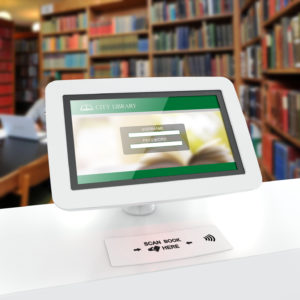5 Ways Interactive Kiosks Can Improve University Libraries
Below are 5 instances where interactive kiosks can aid and improve current processes in university libraries:
- Provide student and staff support

Interactive kiosks can transform efficiency during busy times of the education year. The induction period sees an influx of new students being welcomed onto campus. During August-October library service desks can be inundated, and queues can form as newcomers are seeking advice and information.
Solution: Kiosks can be placed in the area and set-up with the answers to frequently asked questions, and will provide a convenient, time-saving and efficient solution. This absolves any negative experiences of long queues, and it’s creative and interactive.
It’s also a tool that the Student Union can take advantage of for raising awareness of upcoming events, charitable opportunities or campus news. For example, for posts such as “Fresher’s Week” or “Exam peer support available – 5pm in the Atrium”.
- Use for library access control
Forgotten library cards could no longer prohibit access. Travelling or walking all the way onto campus for a day of revising can quickly resolve into frustration when access is denied as a student has forgotten their library card. Alternatively, if manual checks of cards are being undertaken for access to the building to be permitted, queues can form. A kiosk stand can improve both instances.
Solution: Interactive kiosks with scanners can be unmanned, speeding up the signing-in process. Through the use of a fingerprint scanner or facial recognition camera, students can walk up to the barrier and automatically gain access. An additional way to aid the student experience is to add an alert. If a student has library books overdue, a pop-up can appear to remind them.
- Check out and return books
Universities have thousands of students at one time. Bournemouth University currently has 19,000 pupils! Around 2.5 million people are enrolled at one of the 160 universities in the UK. That’s,
on average, 15,625 students enrolled at any one university. The pressure on library staff because of the demand for borrowing books can be greatly relieved by the set-up of a library kiosk system for this purpose. Pupils can manage the borrowing and returning of books without staff support using an easy-to-use library kiosk.
Solution: A multi-device interactive kiosk can be configured with a scanner for scanning student ID cards and book barcodes. Printer functionally can be added to accompany this, issuing a receipt detailing the check-out date, and the return date deadline. Further to this, these interactive kiosks can be used for the payment of fees for returning books late.
- Catalogue kiosk

Added functionality can include a full library e-catalogue for the searching of available titles, as implemented by Queen’s University Belfast with imageHOLDERS. Another function can be to request a textbook to be placed on hold.
Solution: This helps students to quickly view all available titles in the university catalogue. They can set-up an alert to be notified of back-on-the-shelf books. Add extra feature could be to allow pupils to log if a book they are looking for isn’t in the system, providing insight for University. They may consider to stock this, if it’s requested by multiple users of the library kiosk.
- Book meeting rooms or study areas
Using self-service kiosks to see the calendar availability of study areas in the library or on campus will be a considerably faster process for making bookings rather than conferring with a desk attendee. Students can book spaces for use for group projects with just a few taps on the tablet.
Solution: Self-service library kiosks allow for the more efficient means of making a booking. With full visibility of availability, students can decide and confer with peers. Desk staff won’t need to be inundated with this admin request; pupils can manage their own availability and booking.
Browse our range of iPad and tablet kiosks online and discover ways you can change the dynamics of your business with our innovative solutions today. For more information, get in touch with the imageHOLDERS team by calling +44 (0)1202 892863 (UK) or +1 877 450 2172 (US) or email [email protected].